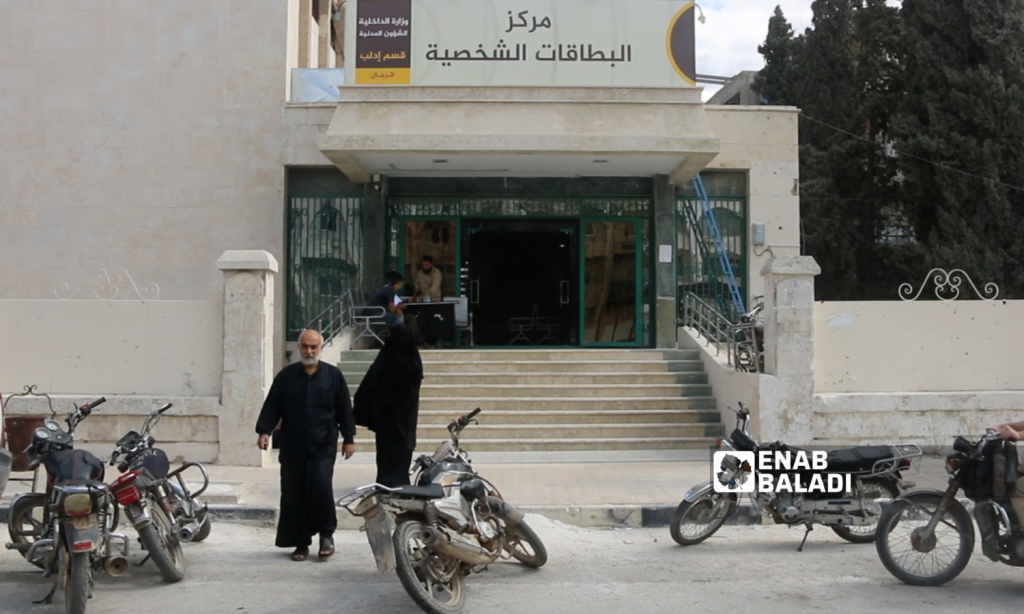Enab Baladi – Idlib
The process of issuing personal identity cards for residents of the areas controlled by the Syrian Salvation Government (SSG) in northern Syria has been going on for three months, in a step that the civilian-led executive governing body considered an organizational issue to manage the affairs of the people in government departments, pointing out that it is the “largest project” in the region.
Ten issuance centers are distributed in five regions, namely Idlib, al-Dana, Sarmada, Harem, and Kafr Takharim, with each center having two sections, one for men and the other for women, and these centers are witnessing a different turnout since the issuance of cards began on 15 September 2022.
“Increasing turnout”
The number of cards issued by the ten centers has reached 71,344 since its launch until the beginning of this January, 53,881 of which have been handed over, according to the latest statistics obtained by Enab Baladi from the General Director of the Directorate of Civil Affairs in the Salvation Government, Abdullah Abdullah.
Abdullah explained that the turnout is “excellent” as a starting point for launching the project, pointing out that there is a continuous increase in the number of applicants for ID cards.
The cost of issuing the ID card is 2.5 US dollars (about 46 Turkish liras), and its issuance is currently limited to civilians, and coordination and study of the matter will be done with the military institutions in the region regarding military personnel, the Interior Minister of the Salvation Government, Mohammad Abd al-Rahman, said in a press conference in September 2022.
The ID card does not have any international recognition because it is a proof of identity within a local domain to conduct transactions in official departments.
A center for issuing personal identity cards affiliated to the Salvation Government in the city of Idlib – October 2022 (Enab Baladi)
The visual identity of the ID card contains the following:
- Features of seven Syrian governorates.
- The word “Syria” and its map are located at the top of the card.
- Graphics showing the ancient Levantine heritage.
The ID card is unbreakable, supported by the English language, and the person’s original residence is mentioned.
Persistent need
The IDP Ahmed al-Ali, based in Idlib, seeks to obtain an ID card due to the lack of recognition of the papers he holds, as he has no identity document other than a card that is not affiliated with any official entity but which bears his personal information.
Al-Ali told Enab Baladi that he wants to obtain a card in order to process any transactions he encounters, such as enrolling his two children in schools or receiving money transfers, indicating that its presence avoids falling into fraud and scams, as he is forced to deal with dozens of merchants and people through his work in a detergents store.
Abd al-Rahman al-Mubayed, an IDP from Eastern Ghouta, told Enab Baladi that he is working on obtaining an ID card because it has become approved in the region and is easy to carry compared to the family booklet he owns or the family record that he extracted from the Salvation Government previously.
Al-Mubayed added that losing the identity card is less harmful than losing the family booklet, which contains the entire family’s data, pointing out that he found it difficult and inflexible to deal with the family booklet he owned within the Salvation Government departments because it is old and the attached photo is old.
As for Mohammad Abd al-Khaliq, an IDP based in Harbanoush camp in the northern countryside of Idlib, he attributed the reasons for not obtaining the ID card with his eight family members to the distance from the card issuance centers and the difficulty of moving to the nearest center.
While Mustafa, a resident of the same camp, attributed the failure to extract the card for himself and his family of four to “negligence.”
A center for issuing personal identity cards affiliated to the “Salvation Government” in the city of Idlib – October 2022 (Enab Baladi)
Organization, tightening the noose
Criticism affected the Salvation Government’s announcement of issuing identity cards amid a tendency not to recognize the previous cards issued by the government of the Syrian regime, as some considered it more than an organizational step and constituted an obstacle for many.
In the upcoming period, the identity card will become mandatory, and most of the residents have to obtain it, and the regime’s identity card will no longer be “valid,” according to the Interior Minister of the Salvation Government.
At the end of 2022, the digital accounts of the Salvation Government published what it called the achievements of the Syrian revolution during 2022, including the project to issue identity cards.
Aaron Zelin, a researcher at the Washington Institute for Near East Policy, considered in a report he published on the Syrian Jihadism website that the issuance of ID cards is “another mechanism that further consolidates Hayat Tahrir al-Sham (HTS)’s governance project through bureaucratic measures to gain a better understanding of who is actually living in its territory. While some might view this as a way to better spy on local residents.”
Zelin said there is also another plausible reason for this: “the transient nature of those that come and go through HTS’ territory, especially from the Syrian National Army territories. Plus, three-quarters of the population in HTS-controlled areas are displaced individuals from different parts of Syria. Thus, from HTS’ perspective, it would make sense to formalize this process.”
With the push of HTS, the Salvation Government was formed on 2 November 2017 from 11 ministerial portfolios headed by Mohammad al-Sheikh at the time, and it settled on ten ministries currently, and it controls the joints of life in Idlib governorate and part of the western countryside of Aleppo, the countryside of Latakia and the al-Ghab Plain, northwest of Hama, in terms of services and administration.

